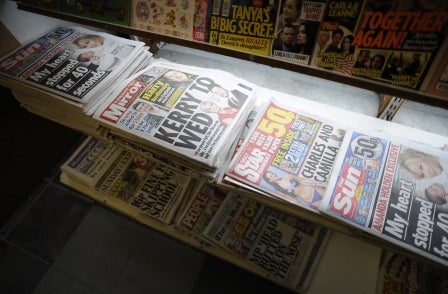
Labour’s pledge to enforce the Leveson report recommendations could ultimately see the UK press threatened with regulation by Ofcom.
The party said in its manifesto launch yesterday: “We expect the industry to establish a mechanism for independent self-regulation, which delivers proper redress for individuals, as set out in the Royal Charter, and agreed by all parties in Parliament.
“We made a promise to victims of the phone hacking scandal. We stand by that promise and will keep it.”
The Leveson report was published in November 2012, but so far no newspaper has signed up with a Leveson-compliant regulator.
Most national newspapers have signed up to the Independent Press Standards Organisation (its chair, Sir Alan Moses, has said it is not compliant with Leveson).
IPSO falls down on Leveson's recommendations chiefly because it is not fully independent of the journalism industry.
It had also said it will refuse to apply for official approval from the Recognition Panel which was outlined by Leveson and set up by the Government last year.
The Guardian, Independent, Evening Standard and Financial Times have not signed up to any regulator.
Rival press regulator Impress may apply for official recognition – but it has yet to reveal any members and is not yet up and running.
If Labour were to form the next government, they would be expected to bring the national press back to the negotiating table.
Leveson suggested in his report that a “backstop regulator” would be required if the press industry “failed to accept the principle of independent regulation”.
A Labour Party spokesman told Press Gazette that its preference is to enforce the Leveson recommendations through negotiation with publishers.
Leveson said in his report that “by a very long way, my preferred solution, and hence my recommendation, is that the industry should come together to construct a system of independent regulation that could be recognised”.
But he added that “if some or all of the industry were not prepared to adopt that position, I do not accept that they should expect the public to settle for less, much less escape standards regulation altogether”.
He said: “My personal view, therefore, is that there may be a need for the realistic prospect of a backstop regulator being established. Second, in relation to the consequences of failure to comply, I am sure that they would have to exist and must be real.”
Leveson said that in his opinion the “statutory backstop regulator” would be given the “powers to enforce standards, including powers to require publication of apologies and corrections, the power to investigate concerns of serious standards breach and the power to impose fines (proportionate to the gravity of any breach and the means to pay) in respect of serious or systemic breaches of standards (or failure to publish a required apology or correction)".
He added: "[M]y clear expectation is that Ofcom would be given this role: it is by far and away the best placed to do so."
Leveson said that the Ofcom press regulator would cover all those providing “press-like services” but would apply “only to those organisations of a sufficient size, and with sufficient impact, to make accountability to society an important Issue”.
IPSO chair Moses is currently in the process of negotiating with publishers’ lawyers to change what he describes as an “awful collection of rules and regulations” which allow newspapers to “obfuscate and resist” investigations.
Email pged@pressgazette.co.uk to point out mistakes, provide story tips or send in a letter for publication on our "Letters Page" blog
